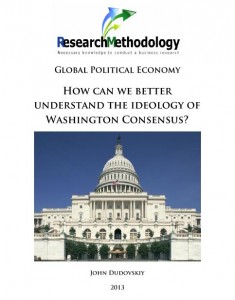How can we better understand the ideology of Washington Consensus?

- Published: December 2013
- 3926 Words
- 17 Pages
This paper critically analyses the ideology of Washington Consensus. The paper starts with discussions about factors and circumstances that have caused the emergence of Washington Consensus. This is followed by discussing positive implications of Washington Consensus for certain countries by referring to relevant facts.
Moreover, the paper highlights major points of criticism of Washington Consensus and the attempts to assess the level of their validity of these points and discusses reasons and circumstances for introduction of Post-Washington Consensus also known as Washington Consensus II. The paper is completed by attempting to the future of Washington Consensus prescriptions in modern dynamic global geo-political environment.
There always have been disparities between countries in terms of the levels of economic developments and this tendency is most likely to continue in the future. However, there have been attempts by highly developed countries to assist the level of economic development of developing countries through various programs involving financial aids and recommendations.
A set of policy recommendations proposed by the US to developing countries has been known as Washington Consensus, and there are mixed opinions about the implementation and outcome of these recommendations (Bandelj and Sowers, 2010).
Introduction 1
Emergence of Washington Consensus 1
Potential Positive Implications of Washington Consensus 4
Criticism of Washington Consensus and the Level of their Validity 6
Washington Consensus II and the Level of its Effectiveness 10
The Future of Washington Consensus 11
Conclusions 14
References 16
International Monetary Fund
World Trade Organisation
World Bank
- Published: December 2013
- 3926 Words
- 17 Pages




